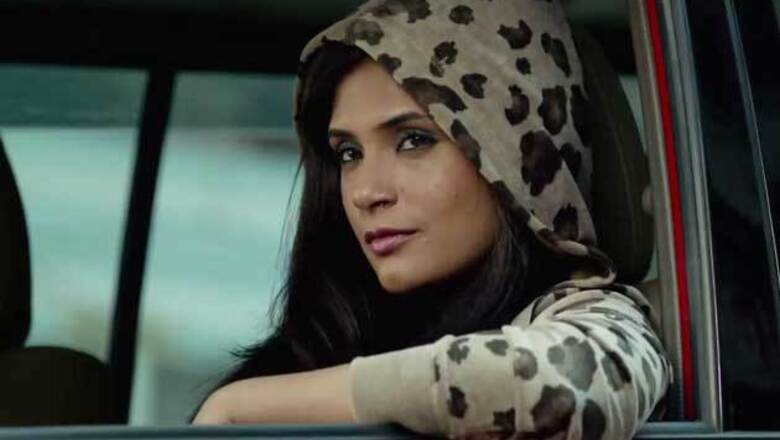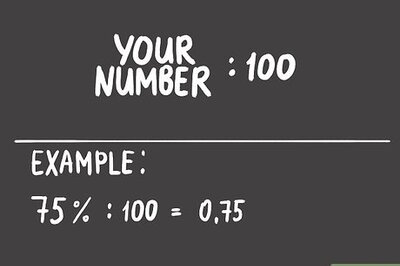
views
New Delhi: In her last film 'Gangs of Wasseypur', Richa Chadda wowed everyone with the effortlessness with which she spewed slang words. With such a stellar start to her professional life, this Stephenian (she studied at St. Stephen's College, DU) knows the worth of being irreplaceable to survive in the industry.
The ambitious and endearing actress, who was in the city to promote 'Fukrey', speaks to IBNLive about gender pay gap in Bollywood, what made her pick a fight with a media person and why being a male actor isn't all that easy.
Akshay Kumar charging a lot for his film is justified: Several actresses have lamented the inability of the producers and distributors to pay female actresses as much as their male counterparts. While many have only rued the male-female income disparity and done nothing, it was the gutsy Kareena Kapoor who voiced her opinion.
Richa Chadda doesn't justify the discrimination either, but she does explain the factors responsible for this inequality. "I don't know what the scene is like now. But if we talk about 'Fukrey', since we all are new, I'm sure I have been paid at par with the male actors. If we are famous that's because of the production house and we understand that the responsibility of making the film a hit also depends on us. So I think I will be able to talk about the gender pay gap when I'm in a position to do so. But when it comes to the mainstream setup, it is a fact that the distributors are under immense pressure to sell their films," she says.
"If you have a film like 'Rowdy Rahthore', people will watch it. For it is a typical Akshay Kumar film - offering an interesting mix of masala and action. So if reports suggest that Akshay Kumar charges a lot for his film or asks for a certain percentage from the profits earned, it is justified. It is all for the hard work they invest in making the film a hit. And that's how the film entered the Rs 100 crore club. But I'm not justifying what's happening in the industry," she adds.
"Also, if Vidya Balan can claim that a film solely done by her can cross the 100 crore mark, I'm assuming her salary is at par with Emraaan Hashmi in 'Ghanchakkar', as the reports have been stating. I feel, the value that actors put in their work does get translated into their commercial viability, "she explains.
Male actor ki market bhi down hoti hai: Going by an instance which Richa narrates, even male actors have to coach themselves to come to terms with outright rejection. "Recently, I heard someone say, 'Let us not sign that actor kyunki uski market abhi down hai. So it happens to male stars too. Since that actor's last few films had flopped, the producers and distributors were wary of casting him. All they said was, 'Iss hero ki toh market down hai'. So yes, male actors also bear the brunt. And there are cases wherein it gets worse for male actors. And if producers/distributors say this, they have a reason for it. They have to sell their films," she explains.
The quest is to become irreplaceable: While there is nothing new in actors being replaced in films, it does focus on how artists are interpreted as mere replaceable commodities. When asked about the trend of replacing actors, Richa said, "I'm too new to comment on this. But yes there are people in the industry who think if X is not available then opting for Y is a better idea. If they have to shoot before monsoon set in, and X doesn't have dates, they will opt for Y. Everybody has to work on compulsion."
Interestingly, Richa doesn't find the producers and directors at fault. "There are many who wait for two years to get the dates of a particular star. And it is not just two years, but 730 days! These producers and directors too have no option but to sit and wait. So the quest is not to become a replaceable commodity. One has to be unique, and not get ignored. And I'm happy it happened to me right in the beginning," she says.
It isn't safe to be insecure: There are many who find insecurities intimidating, and some who love to pretend they don't exist. But Richa knows the best way to deal with one's deep-seated insecurities. "It is not safe to be insecure. But it is human to feel insecure. For me, it is a basic tendency," she chuckles.
Bollywood is like high school: What brings the comparison between Hollywood and high school? Well, it is neither about how the stars behave like spiteful teenagers nor related to camps/groups. Instead it is about how much attention is paid to who said what and who wore which outfit.
"Yes, I agree Bollywood is very much like high school. However, I feel my school was far more forgiving than Bollywood. I could do anything without thinking what people would say. But thankfully, I'm not in a state where I can't be forgiven."
Actors are normal people: Richa has a valid reason to be peeved about media reports done in a callous manner. "There are occasion when I'm hurt by the manner in which incidents are reported by the media. Whether it is nasty reports about Aishwarya Rai weight gain or the Jiah Khan's suicide reportage, media should understand that actors are also normal people," she rues.
Don't treat our lives as public property: And it was precisely because of their uncaring behaviour that Richa didn't mind getting into a spat with a journalist in Jaipur. Recalling the incident, Richa says, "Once I got into an argument with a media person in Jaipur because he had said, 'Actors ki life public property hoti hai'. That's not correct. Actors are human beings. So why should their lives be treated as public property? I agree our brand and onscreen roles are public property, but not our personal lives," she clarifies.















Comments
0 comment